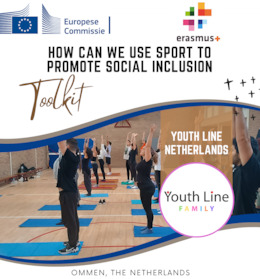Toolbox — For Training and Youth Work
All new tools in your inbox: Be the first to know about new tools for learning with our e-mail notifications.
Manual
How can we use sport to promote social inclusion
Our toolkit provides practical activities and guides for youth workers to promote inclusion through sports, dance, music, and more, fostering diversity and positive social connections.
Aims of the tool
- Equip youth workers and organizers with practical tools and strategies to promote social inclusion through various activities, including sports, dance, and music.
- Foster understanding and empathy among participants by addressing the barriers faced by migrants and refugees through interactive workshops and discussions.
- Empower young people in the EU to utilize sports and other activities as vehicles for promoting diversity, community connection, and positive social dynamics.
- Facilitate the sharing of project results and toolkit resources on open-source platforms for wider accessibility and utilization by youth workers across Europe.
Description of the tool
Welcome to our comprehensive toolkit designed to equip youth workers and organizers with the necessary resources and strategies for utilizing sports and a variety of activities as powerful tools for promoting social inclusion and fostering community connection among young people. With a dedicated focus on addressing the unique barriers faced by migrants and refugees, our toolkit offers a rich array of practical guides, interactive workshops, and innovative approaches aimed at breaking down cultural barriers, fostering diversity, and nurturing positive social dynamics.
From organizing sports events that bring together individuals from diverse backgrounds to hosting inclusive dance workshops and music sessions, our toolkit provides step-by-step guidance and adaptable frameworks for creating impactful experiences. Through engaging activities and meaningful discussions, participants are encouraged to explore and challenge perceptions, build empathy, and develop a deeper understanding of the importance of inclusivity and acceptance.
By empowering youth workers with the knowledge and tools needed to navigate complex social dynamics, our toolkit aims to inspire and enable young people across Europe to become catalysts for change in their communities. Through collaboration, creativity, and a commitment to inclusivity, we can work together to build a more cohesive and united society where everyone feels valued and included.
Available downloads:
Disclaimer
SALTO cannot be held responsible for the inappropriate use of these training tools. Always adapt training tools to your aims, context, target group and to your own skills! These tools have been used in a variety of formats and situations. Please notify SALTO should you know about the origin of or copyright on this tool.
Tool overview

http://toolbox.salto-youth.net/4184
This tool is for
The target group for the toolkit includes: Youth workers: Individuals actively engaged in working with young people, including educators, community organizers, social workers, and youth group leaders. Organizers of youth events: Those responsible for planning and executing activities, events, and programs aimed at engaging and empowering young people. Community leaders: Individuals in leadership positions within community organizations, NGOs, and local government bodies who seek to promote social inclusion and diversity among youth. Young people: Individuals between the ages of 15 to 30 who are interested in participating in activities that promote social inclusion, community connection, and positive social dynamics. Migrant and refugee communities: Individuals who have migrated to a new country or region and may face social, cultural, and linguistic barriers to integration and inclusion.
and addresses
Social Inclusion, Group Dynamics, Intercultural Learning, European Citizenship
It is recommended for use in:
Youth Exchanges
Training and Networking
Materials needed:
The materials needed for utilizing the toolkit include:
- Printed or digital copies of the toolkit documents, including guides, workshop outlines, and activity templates.
- Access to suitable venues or spaces for hosting workshops and activities, such as community centers, sports facilities, or outdoor areas.
- Basic stationery supplies, including pens, paper, markers, and sticky notes, for facilitating interactive activities and discussions.
- Audio-visual equipment, such as projectors and speakers, for presentations and multimedia content during workshops.
- Sports equipment and props for conducting sports-related activities, such as balls, cones, and mats.
- Musical instruments or audio devices for conducting music-based workshops and sessions.
- Translation and interpretation services, if working with diverse language groups, to ensure effective communication and inclusivity.
- Refreshments and snacks to keep participants energized and engaged during workshops and activities.
- Printed or digital promotional materials, such as posters and flyers, to advertise workshops and events to the target audience.
- Evaluation forms or surveys to gather feedback from participants and assess the impact of the toolkit's activities on promoting social inclusion and community connection.
Duration:
The duration required to complete this toolkit varies depending on the specific activities and workshops chosen for implementation. While some activities may be completed in as little as 15 minutes, others may require up to 2 hours or longer for full participation and engagement. The toolkit is designed to be flexible, allowing users to select and adapt activities based on their available time, resources, and the needs of their target audience. Additionally, the training process for utilizing the toolkit may involve familiarization with its contents, planning and preparation for workshops and activities, and ongoing evaluation and reflection on outcomes achieved. Training sessions may vary in length depending on the level of familiarity with the toolkit and the desired depth of understanding of its implementation strategies.
Behind the tool
The tool was created by
Stichting Youth Line Netherlands
The tool was published to the Toolbox by
Kateryna Shepeliuk (on 9 May 2024)
and last modified
3 May 2024
Comments
No comments have been posted yet.
If you want to comment on this tool, you need to be signed in with your MySALTO account. Sign in now